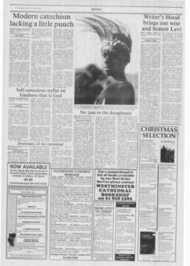Page 2, 10th November 1989
Page 2

Report an error
Noticed an error on this page?If you've noticed an error in this article please click here to report it.
Tags
Share
Related articles
New Fears For Salvador Churchmen
Where Men Of Peace Still Die
Clerics At Centre Of Salvador's Tragedy
'worrying Signs' In El Salvador
Letter From America
Salvador church workers arrested
by Sarah Stewart
OVER a thousand Salvadoran refugees returned to their country last week in a repatriation marked by government obstruction and the arrest of leading members of church agencies, including the archdiocese of San Salvador.
During a visit to Britain in September, President Alfredo Cristiani assured British agencies supporting the repatriation, among them Christian Aid and CAFOD, that the return would go smoothly. But events show otherwise. "The arrests were a warning to the churches not to get involved," said one British agency worker. "The government doesn't want the refugees to come back to El Salvador, and its letting that be known."
The refugees have been living in the enormous Mesa Grande camp in Honduras since the early 1980s. when violent civil war forced them to flee across the border. 1 hree other repatriations have preceded them like this one. They have been aided by Diaconia. a Salvadoran ecumenical agency whose backbone is the social secretariat of the Archdiocese of San Salvador. Financial support is provided by the EEC and British and European agencies.
For all the returning refugees the issue is the same: the right to live in their own country. But because they want to return to their homes, which are in the disputed areas of Chalatenango and Cabanas, the government suspects them of supporting the opposition guerrilla movement.
Communities of refugees who have returned in earlier* years have been routinely subject to military searches and attacks including San Jose Los Flores and San Antonio Los Ranchos. Military occupations are not uncommon, and people are afraid to work in the fields because of patrolling soldiers.
On the morning of October 26 a long caravan of buses and trucks carrying the 1,350 refugees and their household goods assembled at the border town of El Poy, ready to pass through military checkpoints and immigration back to Salvador. . They had planned to leave two weeks earlier, but had been delayed by government obstruction over the issue of identity cards. In the meantime people had pulled down their houses and were sleeping rough. Three people an elderly man and two children had died because of the cold and spreading illnesses.
Just before noon, plainclothes men waved aside two vehicles carrying six members of the church and refugee agencies helping in the repatriation. Police then took them to the Fourth Brigade and from thereto the National Guard in El Salvador. They were told not to ask any questions and wete not given any reason for their arrest. At National Guard headquarters the six were handcuffed and blindfolded. Under interrogation, they were told to sign statements saying that they were participating in "terrorist organisations".
International protest, including the British Council of, Churches, succeeded in gaining their release at 5.00pm the next day. "If it wasn't for the support of international organisations," said one of the arrested church workers, "we might still be there."
While the refugees have now all reached their final destinations in Chalatenango and Cabanas and arc setting up their first rudimentary homes, the arrests are a grim reminder of the dangers of the repatriations. This is the first time so many top-level church and refugee agency workers have been arrested, and it is prompting fears about the future safety of the refugees and the churches supporting them.
Nonetheless, there is a sense of victory that people have successfully claimed their right to live in their own country. "People are tired," said the relative of one returning refugee, "but they are determined. They have a lot of hope. It's a real triumph that people have come back home."
Sarah Stewart is a journalist for Christian Aid who visited El Salvador in August.
blog comments powered by Disqus











